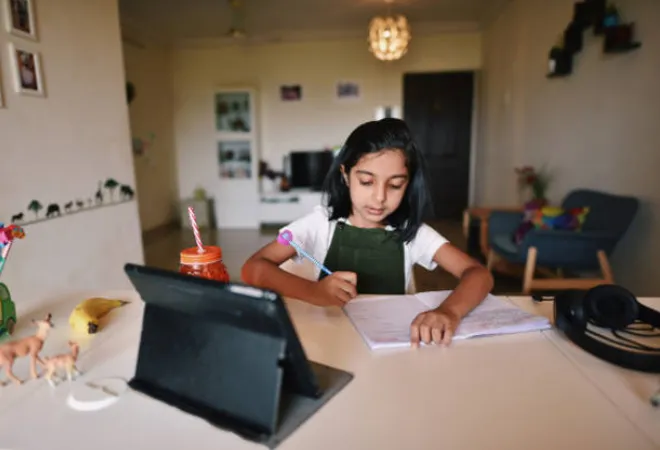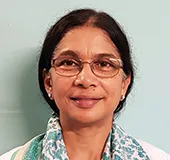
The sudden lockdown due to the Covid-19 pandemic has thrust schools and teachers of both public and private institutions into an emergency remote teaching mode. As it becomes increasingly clear that the pandemic situation is likely to force the coming academic year to continue online, at least in some geographies, state governments and even the MHRD are looking for best practices and SOPs (standard operating procedures) for online education that can be shared with the school managements, teachers and parents. At this juncture, therefore, it is essential to review some of the recent experiences of emergency remote teaching and derive some useful lessons.
Learning from children
Experts suggest that some of the important lessons on the way forward could be learnt best from not just preparing overarching SOPs that largely are framed using a top-down approach, but by rather making the school children important stakeholders in the process. Evaluating how the online medium of teaching is interacting with children’s learning processes gives far greater insights on how the government, institutions and teachers can adapt to the new and evolving scenario.
Some of the important lessons on the way forward could be learnt best from not just preparing overarching SOPs that largely are framed using a top-down approach, but by rather making the school children important stakeholders in the process.
“Kids figure out a lot on their own intuitively in ways that most adults, being new to the medium, struggle with. We have an opportunity therefore to re-think about what the medium affords us, and how we can use it to re-imagine the learning process, as we bring technology into the mainstream of schooling beyond the crisis.” said Prof. Padma Sarangapani of the Centre for Education, Innovation and Action Research (CEIAR) at the Tata Institute of Social Sciences (TISS) at a webinar organised by ORF. Prof. Sarangapani has been spearheading the CEIAR’s efforts to promote innovative use of new technologies and media to raise relevance, quality and standards of education.
Teachers are wisely making use of the autonomy they have been given and the truncated contact hours to guide students through their own learning process through activity-based learning, rather than trying to replicate the face-to-face teaching model. This flipping of responsibility, putting students in charge of their own learning, albeit with different degrees of guidance from teachers and support from parents, is helping to develop student agency. Students are taking the initiative, and developing their own voice, as they learn through activities, working on their own, also in collaboration with peers and adults. Their ability to think and act of their own accord, there needs to be nurtured and developed further, said Sangeeta Nag of Pathways School, Gurugram.
This flipping of responsibility, putting students in charge of their own learning, albeit with different degrees of guidance from teachers and support from parents, is helping to develop student agency.
However, the tactile experience of a nod, or a pat on the back are reassuring moments that are impossible to replicate online. Sangeeta Krishnan Nag of Pathways School, Gurugram, recalled how some of the smaller children actually went up to the screen to kiss their teachers, while the older children were also trying to figure out how to convey to their teachers that they were missing them. Therefore, the critical ‘visual connect’ between the teacher and students must not be compromised in designing any online education sessions using various video conferencing tools.
Addressing accessibility issues
Online education is necessary because children benefit from structured learning environments, and there is a danger of them regressing if their education is interrupted for too long. The Bengaluru-based Parikrma Humanity Foundation, which works for education of children in the city’s informal settlements collected spare smartphones and used them to create virtual schools for approximately 2,000 children, all first-generation learners, from 87 slum communities. Two or three students gathered at selected homes with appropriate physical distancing and shared a smartphone. School began with assembly at 8.15 a.m. each morning and halted for the day at 12.30 p.m. with a break in between so that the cell phones could be charged. “Teachers have responded brilliantly to the challenge, the crisis bringing out their willingness to participate and help,” said Parikrma’s founder Shukla Bose, adding that these virtual schools had over 90 percent attendance.
Approximately 90 percent of women teachers have access to smartphones but only some 40 percent have access to laptops.
Likewise, efforts put in by teachers from government schools, who were trained by TISS, have helped them to reach up to 40 percent of their students living in remote areas in Assam, and to students in madrasas of West Bengal, who did not have access to technology, trying to reach them on regular calls. “The idea is to make teachers play a pivotal role in becoming designers and active creators of activities for students, while putting technology in the hands of students in a constructive way for knowledge creation and not just for passive consumption. This was already happening pre-Covid thanks to TISS’ interventions, but it is now even more important to continue to nurture and invest in teacher autonomy through high quality continuous professional development programmes post-Covid,” said CEIAR’s Dr. Amina Charania.
Further, CEIAR’s research has revealed that there is neither age-related or gender-related bias among teachers using technology. Approximately 90 percent of women teachers have access to smartphones but only some 40 percent have access to laptops. Given that smartphones are mainly consumption devices, not really well suited to the creation of content, it would be worthwhile for governments to provide teachers with laptops and internet connections, as suggested in the DNEP 2019, if they are serious about continuing with online education.
With the governments pushing online education, there is also a gradual change in the perception of some parents that serious education cannot be done using the cell phone.
Although parents tend to worry about giving too much screen time to their children, a survey conducted among low-income families by Central Square Foundation (CSF) revealed how — even in the pre-Covid days — children between the ages of 3 to 9, were spending an hour to 90 minutes each day on their parents’ phones each day. CSF is now advocating for this time to be spent on watching engaging and high-quality educational content to reduce the learning gap and achieve foundational literacy. With the governments pushing online education, there is also a gradual change in the perception of some parents that serious education cannot be done using the cell phone. CSF’s Gouri Gupta likened the Covid crisis as being a “Sputnik moment for EdTech (educational technology) in India” and that understanding what works and what does not will be very important in the post-Covid inclusive growth of EdTech in the country.
Learnings for creating a conducive policy framework
State governments such as Karnataka and Maharashtra have banned online classes for very young children, but Karnataka has allowed the use of recorded videos and has appointed a committee to suggest guidelines for revoking the ban. It would be good for such committees to keep some of the learnings outlined here in mind. The guidelines that MHRD is contemplating i.e., restricting the length of class time to up to two hours on weekdays, getting parents and volunteers to help teachers, and requiring schools to offer content in multiple mediums to cater to students with varying degrees of technology access or even no access, and providing for the physical and mental health of students, are all very good steps in the right direction.
The use of a combination of synchronous and asynchronous learning is known to reinforce learning, and to improve learning outcomes.
A few additional considerations are critical to keep in mind. The first is the need to nurture and protect the autonomy of teachers as well as the opportunity for both teachers and students to continue to develop agency in the way they are doing now. This is very valuable in the context of helping students develop 21st century skills — the multiple literacies, competencies, and character qualities, also envisaged in the DNEP 2019. The use of a combination of synchronous and asynchronous learning is known to reinforce learning, and to improve learning outcomes.
As we continue with online education, one key concern that remains to be addressed adequately is the issue of assessments, especially for students in transitional grades, such as Grade 10, or Grade 12. State governments and MHRD are still grappling with this decision in the light of its impact on admissions but it is becoming apparent that we may need to look at the pending assessments in 2020 and also assessments during the 2020-21 academic year very differently. The country has for long fallen back on centralised exit examinations, and similar entrance examinations, as the only broadly acceptable method of assessment and criteria for admissions. The disruption brought by the pandemic has already focused attention on the pivotal role of teachers and on the immense value of student and teacher agency. If we could also be open and begin a conversation about re-thinking assessments, and moving towards skills and competency-based assessments, we will have used the opportunity provided by the pandemic to take another important step in the right direction.
The views expressed above belong to the author(s). ORF research and analyses now available on Telegram! Click here to access our curated content — blogs, longforms and interviews.




 PREV
PREV


